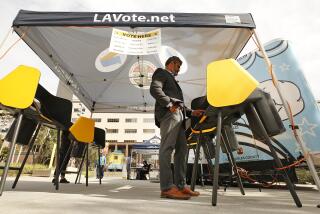Coelho Acknowledges Investing $100,000 in Junk Bonds in ’86
- Share via
WASHINGTON — House Assistant Majority Leader Tony Coelho (D-Merced) on Wednesday acknowledged that he had made a $100,000 personal investment in high-yield junk bonds issued by Drexel Burnham Lambert Inc. in 1986 on the advice of a friend from Southern California but said that his tip did not come from Drexel junk-bond king Michael Milken or any other Drexel employee.
Coelho, who is known to be a personal acquaintance of Milken and who has received contributions and honoraria from Drexel, said he could not explain why his investment was originally recorded by Drexel in the name of the Coelho campaign committee. He said he bought the bonds with money that he borrowed through a personal bank loan.
The investment was first reported by the Washington Post, which asserted that the bonds purchased by Coelho are the type generally available only to institutional investors and regular Drexel customers.
Coelho spokesman David E. Dreyer denied that the transaction was in any way improper.
“Tony personally borrowed the money, made the investment, sold the bonds, made a profit and reported the purchase, the borrowing and the profit on his financial disclosure form,” he said.
In a letter written by Coelho in response to the story, the congressman declined to identify the person who advised him to make the investment in the bonds, which were issued to finance the takeover of Beatrice Foods. He identified his adviser only as “a friend from Southern California.”
Netted Profit
The investment, which netted him a profit of $6,882 over six months, was the largest purchase of securities reported by Coelho and his first venture into the junk-bond market.
“My decision to purchase the bonds had nothing to do with either Drexel, Milken or an employee of Drexel,” Coelho wrote. “I did not speak either to Drexel or Milken about the investment, and neither Drexel nor Milken recommended it to me.
“I did not know that Drexel was the broker for the bond or that Drexel was in any way involved. The purchase was reviewed and approved by my accountant for that kind of advice.”
Milken was indicted earlier this year on a number of securities violation charges in connection with his activities at Drexel.
Drexel originally recorded the purchaser as the Coelho campaign committee, but Coelho said that was erroneous and that the company was asked to correct it.
In 1986, when Coelho held the bonds, he was chairman of the Democratic Congressional Campaign Committee. The committee received more than $100,000 from the Drexel political action committee and its employees in the period between September, 1985, and the end of 1986.
The Drexel committee gave $8,000 to Coelho’s personal political action committee during 1986 and 1987, and the congressman received $4,000 in honoraria from Drexel during that period.
Last January, Coelho acted as a middleman in successful efforts by a group of congressman to persuade the Securities and Exchange Commission to drop its demand that Drexel close down Milken’s junk-bond headquarters in Beverly Hills as part of an expected settlement of a long civil investigation of Drexel.
Although Coelho himself did not send a letter to the SEC on Drexel’s behalf, he acknowledged that he enlisted the support of Sen. Alan Cranston (D-Calif.), who did write to the SEC. Coelho said he acted at the request of Los Angeles Mayor Tom Bradley.
In his letter about his investment, Coelho blamed a “computer error” for listing his junk-bond investment as “Coelho for Congress, Attn. Jeff Denno, Box 943, Modesto, Ca. 95353.” He said the error was eventually corrected in response to repeated letters from a member of his congressional staff.
Coelho’s 1986 financial disclosure statement shows that he borrowed between $15,000 and $50,000 from two California banks, repaying the notes on Oct. 28, the day the bonds were sold. Members of Congress are not required to list their earnings, assets or debts precisely, but only to state their transactions within specified ranges.
More to Read
Inside the business of entertainment
The Wide Shot brings you news, analysis and insights on everything from streaming wars to production — and what it all means for the future.
You may occasionally receive promotional content from the Los Angeles Times.










